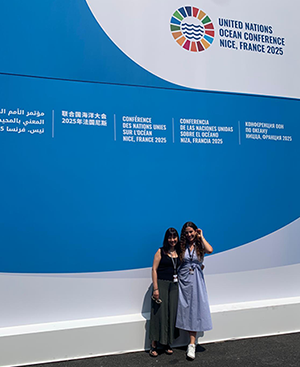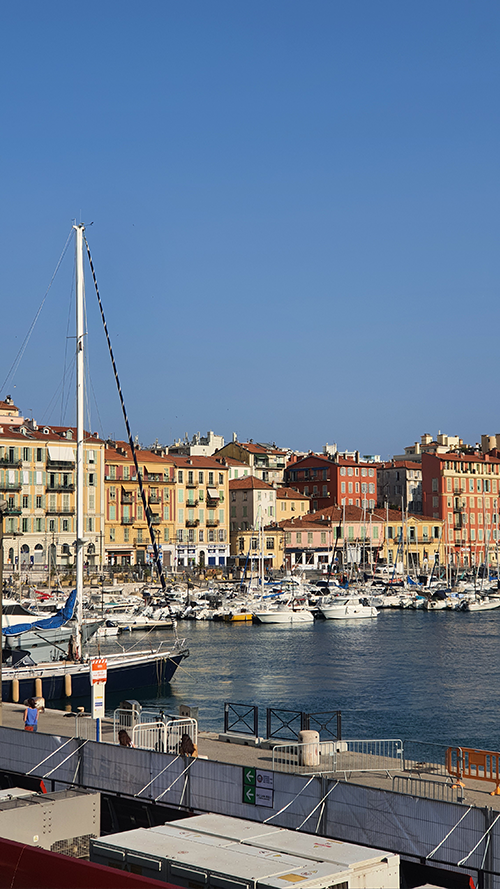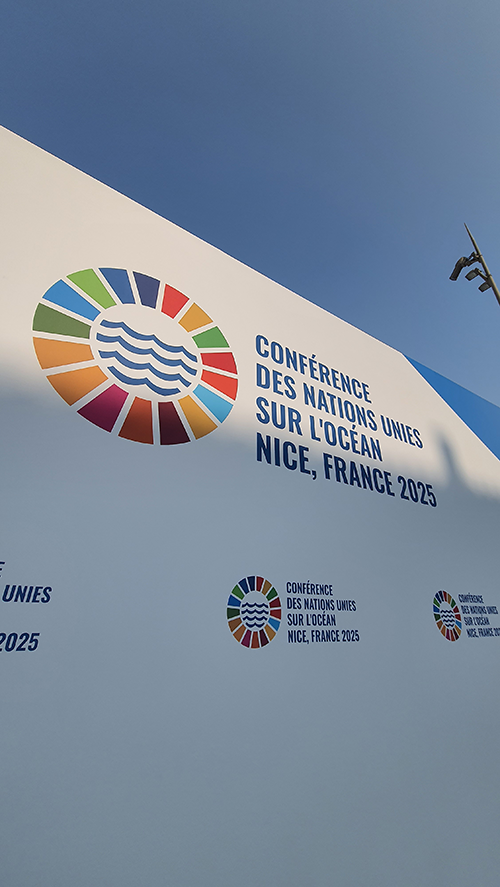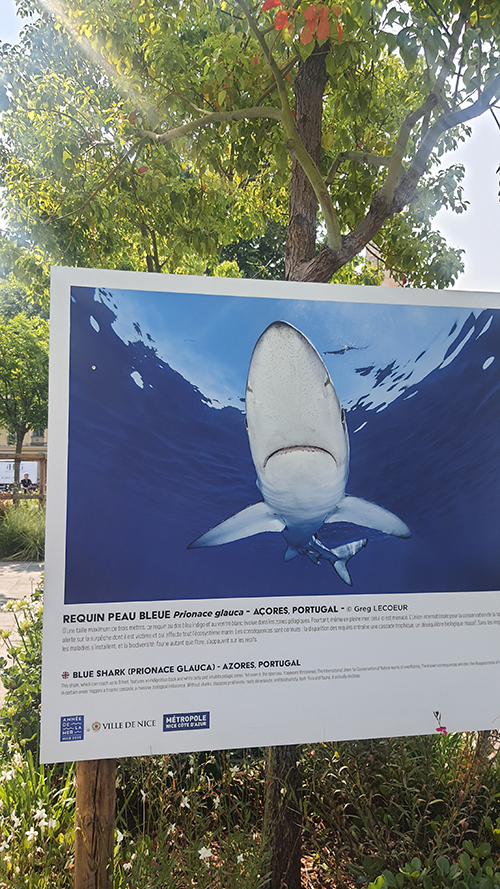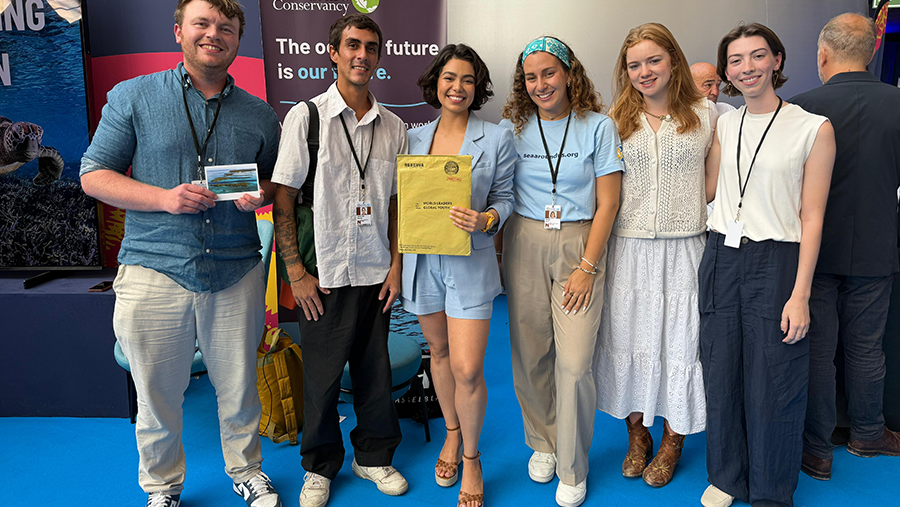
The Sea Around Us MSc student, Anna Luna Rossi (fourth from the left), with her NGO Reserva colleagues and actress Auli’i Cravalho at UNOC 2025.
By Anna Luna Rossi.
June 2025 marked the third edition of the United Nations Ocean Conference, hosted in Nice, France, and co-organized by France and Costa Rica. UNOC3 falls within the Ocean Decade initiative to create a framework for communicating and using ocean knowledge to generate real-time actions for safeguarding our marine resources.
I travelled to the South of France to attend UNOC from June 9th to June 13th. I was part of the delegation of the NGO Reserva: The Youth Land Trust. Reserva is a youth-led NGO, aiming to provide tools for young people to concretely engage in biodiversity protection initiatives through conservation projects, storytelling, and funding events.
Reserva created the world’s first entirely youth-funded nature reserve in Ecuador, and since 2022, has been collaborating with marine ecology projects. At UNOC, Reserva was representing (and partnering with) two marine conservation initiatives: The Leatherback Project, working on protecting and monitoring the nesting behaviour of leatherback turtles in Panama, and Friends of Aldabra, working on guarding biodiversity in the archipelago of Aldabra in the Seychelles, against harmful hotel developments.
Our goal at the conference was not only to spread the word about our projects but also to find new partners who could bring in their expertise on conservation issues, as well as resources for these initiatives. I’ve been on the Youth Council and Scientific Committee of Reserva since 2022, and it was great to get the opportunity to meet fellow members and share the word about our mission with like-minded individuals and government officials at UNOC.
Nice in blue
The entire city of Nice seemed to have dressed in blue: underwater photography exhibitions in the street, ocean art on the walls, whale sounds in the public transports, special events organized everywhere… everything was “on brand,” as an ode to the sea along which Nice was built.
On top of the secured area of the ‘Blue Zone’ where official proceedings such as plenary sessions and Ocean Action Panels were held, a ‘Green Zone’ known as ‘The Whale’ had been created at the Palais des Expositions. This Green Zone, open to the public, was designed to make visitors feel as if they had just dived under the sea (light and sound effects included): a place for everyone to converge around several thematic pavilions with conferences, panels, film screenings, and interactive exhibitions.
If I could use one word to describe UNOC, it would be ‘overwhelming.’ First, because the few allotted days for the conference meant that numerous events were happening at the same time, and it was incredibly hard to choose which one to attend, both in terms of personal interests, and also in terms of where it was strategic to network for our NGO. Most days, I secretly wished I could duplicate myself. This, combined with the number of government officials, fellow ocean advocates, and scientists we were meeting and networking with, left me completely exhausted every day. Overwhelming also because UN conferences can be a lot of talk, and very little action. Several milestones that we were hoping to see happen at UNOC did not, such as the ratification of the high-seas treaty, and the implementation of true restrictive measures on fishing in French Marine Protected Areas.
But on the other hand, I saw the launch of the global coalition Halt Shark and Ray Extinction, of the One Ocean Finance Facility, the creation and expansion of several MPAs around the world, and promising progress over the BBNJ agreements. In a week, four new countries pledged support for a moratorium on deep-sea mining; 11 countries signed a new pledge to protect climate-resilient coral reefs, 20 more signed the High-Seas Treaty, and 19 more ratified it. And importantly, I witnessed an uplifting number of young people being given the stage to speak about current issues affecting our marine ecosystems, and ways to mitigate them.
It was inspiring and encouraging to witness such an engagement to protect our oceans.
UNOC allowed me to dip my toes into ocean advocacy, something I had explored in the past, but never this tangibly. Being surrounded by young voices, as well as passionate ocean advocates of all ages and backgrounds, highlighted the importance, as a young researcher, of ensuring my work is aligned with current challenges in ocean conservation. It reinforced my sense of responsibility to use my scientific knowledge and experience to help bridge the gap between ocean science and marine conservation policy.
- Photo by Anna Luna Rossi
- Photo by Anna Luna Rossi
- Photo by Anna Luna Rossi


